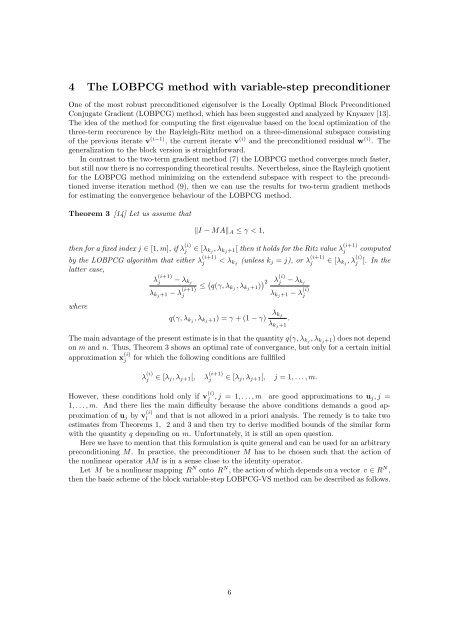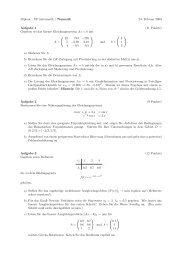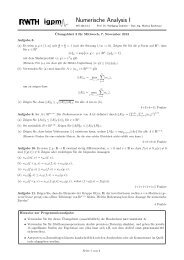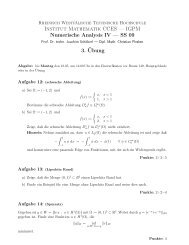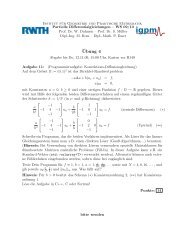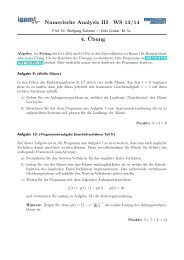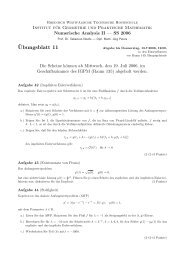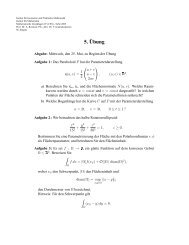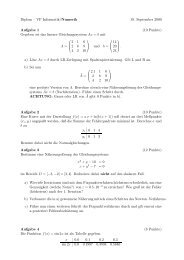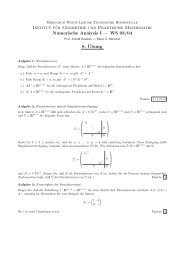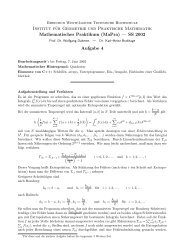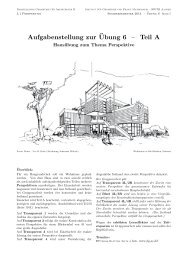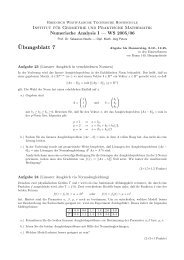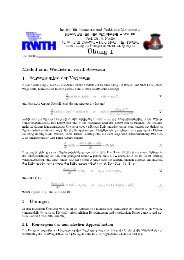Variable-step preconditioned conjugate gradient method for partial ...
Variable-step preconditioned conjugate gradient method for partial ...
Variable-step preconditioned conjugate gradient method for partial ...
Create successful ePaper yourself
Turn your PDF publications into a flip-book with our unique Google optimized e-Paper software.
4 The LOBPCG <strong>method</strong> with variable-<strong>step</strong> preconditioner<br />
One of the most robust <strong>preconditioned</strong> eigensolver is the Locally Optimal Block Preconditioned<br />
Conjugate Gradient (LOBPCG) <strong>method</strong>, which has been suggested and analyzed by Knyazev [13].<br />
The idea of the <strong>method</strong> <strong>for</strong> computing the first eigenvalue based on the local optimization of the<br />
three-term reccurence by the Rayleigh-Ritz <strong>method</strong> on a three-dimensional subspace consisting<br />
of the previous iterate v (i−1) , the current iterate v (i) and the <strong>preconditioned</strong> residual w (i) . The<br />
generalization to the block version is straight<strong>for</strong>ward.<br />
In contrast to the two-term <strong>gradient</strong> <strong>method</strong> (7) the LOBPCG <strong>method</strong> converges much faster,<br />
but still now there is no corresponding theoretical results. Nevertheless, since the Rayleigh quotient<br />
<strong>for</strong> the LOBPCG <strong>method</strong> minimizing on the extendend subspace with respect to the <strong>preconditioned</strong><br />
inverse iteration <strong>method</strong> (9), then we can use the results <strong>for</strong> two-term <strong>gradient</strong> <strong>method</strong>s<br />
<strong>for</strong> estimating the convergence behaviour of the LOBPCG <strong>method</strong>.<br />
Theorem 3 [14] Let us assume that<br />
�I − MA�A ≤ γ < 1,<br />
then <strong>for</strong> a fixed index j ∈ [1, m], if λ (i)<br />
j ∈ [λkj , λkj+1[ then it holds <strong>for</strong> the Ritz value λ (i+1)<br />
j computed<br />
by the LOBPCG algorithm that either λ (i+1)<br />
j < λkj (unless kj = j), or λ (i+1)<br />
j<br />
latter case,<br />
where<br />
λ (i+1)<br />
j<br />
− λkj<br />
λkj+1 − λ (i+1)<br />
j<br />
≤ � q(γ, λkj , λkj+1) �2 λ (i)<br />
j<br />
q(γ, λkj , λkj+1) = γ + (1 − γ) λkj<br />
− λkj<br />
λkj+1 − λ (i)<br />
j<br />
λkj+1<br />
.<br />
∈ [λkj , λ (i)<br />
j<br />
[. In the<br />
The main advantage of the present estimate is in that the quantity q(γ, λkj , λkj+1) does not depend<br />
on m and n. Thus, Theorem 3 shows an optimal rate of convergance, but only <strong>for</strong> a certain initial<br />
approximation x (i)<br />
j <strong>for</strong> which the following conditions are fullfiled<br />
λ (i)<br />
j ∈ [λj, λj+1[, λ (i+1)<br />
j ∈ [λj, λj+1[, j = 1, . . . , m.<br />
However, these conditions hold only if v (i)<br />
j , j = 1, . . . , m are good approximations to uj, j =<br />
1, . . . , m. And there lies the main difficulty because the above conditions demands a good approximation<br />
of uj by v (i)<br />
l and that is not allowed in a priori analysis. The remedy is to take two<br />
estimates from Theorems 1, 2 and 3 and then try to derive modified bounds of the similar <strong>for</strong>m<br />
with the quantity q depending on m. Un<strong>for</strong>tunately, it is still an open question.<br />
Here we have to mention that this <strong>for</strong>mulation is quite general and can be used <strong>for</strong> an arbitrary<br />
preconditioning M. In practice, the preconditioner M has to be chosen such that the action of<br />
the nonlinear operator AM is in a sense close to the identity operator.<br />
Let M be a nonlinear mapping RN onto RN , the action of which depends on a vector v ∈ RN ,<br />
then the basic scheme of the block variable-<strong>step</strong> LOBPCG-VS <strong>method</strong> can be described as follows.<br />
6


